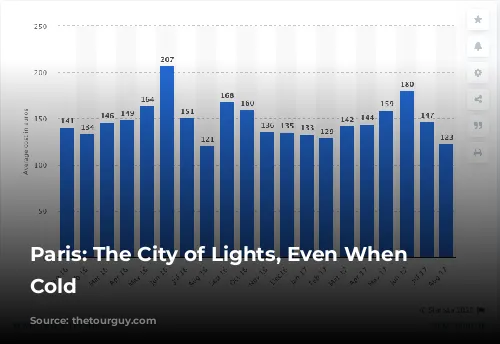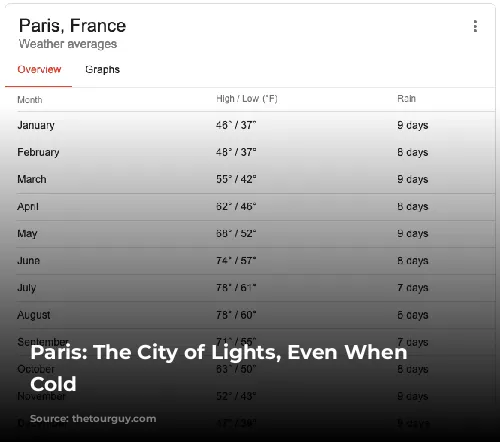Paris is a city that truly has it all – from world-class museums and charming cafes to stunning architecture and romantic parks. Whether you’re a history buff, a foodie, or simply looking for a romantic getaway, Paris has something to offer everyone. But figuring out the best time to visit can be tricky, especially with its unpredictable weather. Don’t worry, this guide will walk you through the ins and outs of traveling to Paris, helping you find the perfect time to experience the magic of this incredible city.
Weather in Paris: Finding the Sweet Spot
Paris boasts a relatively mild climate, but don’t let that fool you. The city’s weather can be quite fickle, with rain, wind, and humidity impacting how the temperatures feel.
The good news is that even when it’s cold, you can still bundle up and enjoy the city’s many attractions. Think cozy cafes with steaming mugs of hot chocolate, exploring hidden bookshops, or strolling through museums.
Here’s a quick breakdown of Paris’s weather patterns:
- Temperature: The average temperatures range from a chilly 3°C (37°F) in January to a pleasant 26°C (78°F) in July. However, expect some fluctuations outside these averages throughout the year.
- Humidity: Paris has relatively high humidity, averaging around 78%, which can make the air feel even cooler, especially during the colder months.
- Wind: The windiest months are from October to April, with January 16th being the windiest day of the year. If you’re sensitive to wind, consider visiting during the calmer months of August or April through October.
While Paris’s mild temperatures are a plus, remember that wind and humidity can make it feel colder than expected, especially during the winter months. But don’t let that deter you! Paris is beautiful year-round, and with the right planning, you can enjoy it no matter the weather.
The Art of Saving: When to Find the Best Deals in Paris
Let’s talk about money – a crucial factor when planning any trip. While Paris isn’t known for being cheap, you can still find great deals and stretch your budget with a little planning.
The key is to avoid peak season and travel during the shoulder seasons – those periods before and after the busiest times. Here’s a breakdown of the best months for deals and the times to steer clear:
Best Time for Deals:
- August: This is surprisingly the cheapest month to visit Paris, thanks to many Europeans taking vacations and leaving the city. While some shops and restaurants may be closed, you’ll find lower prices on hotels, flights, and even tours.
- November to February: These months are generally quieter and offer lower prices on accommodation and flights.
Peak Season:
- April (excluding Easter week): You might find a deal or two, but prices tend to be higher due to spring break and Easter travel.
- May to July and September to October: These are the busiest months in Paris, and you’re unlikely to find any deals on flights or accommodation.
Remember, these are general trends and prices can fluctuate based on demand and other factors. It’s always a good idea to book your flights and accommodation in advance to secure the best rates.
Navigating the Holidays in Paris: A Guide to Major Events
Paris comes alive during holidays, offering a unique experience for visitors. But it’s important to understand how these events can impact travel prices and crowds. Here’s a guide to major holidays in Paris and their potential effects:
- New Year’s Day (January 1): Expect closures and higher prices due to peak season travel.
- Easter (April): Expect closures, reduced metro service, and higher prices. Room rates and flights may remain high for a week on either side of Easter.
- Labor Day (May 1): Expect reduced mass transit schedules and closures. You might even find lower prices on flights and hotels due to closures.
- Victory in Europe Day (May 8): Expect reduced mass transit and closures. You’ll see parades, particularly along the Champs Élysées.
- Ascension Day (May): Expect some reduced mass transit schedules and closures outside of tourist centers.
- Whit Monday (May): This is a bank holiday with closures and reduced mass transit schedules.
- Bastille Day (July 14): This is the biggest holiday in Paris, with parades, concerts, and street parties. Expect higher prices and crowds.
- Feast of the Assumption (August 15): Expect reduced mass transit service, restaurant closures, and a generally empty city.
- All Saints Day (November 1): This is a Catholic holiday with many people visiting cemeteries. Most tourist attractions will be open.
- Armistice Day (November 11): Expect modest closures and reduced transportation schedules.
- Christmas Day (December 25): Expect almost everything to be closed.
Knowing these holidays can help you plan your trip around the crowds and potential closures. It’s always a good idea to check restaurant and attraction websites for specific opening hours during holidays.
With this insider knowledge, you’re ready to explore the City of Lights. Remember to embrace the unpredictable weather, find those hidden deals, and experience the magic of Paris.



